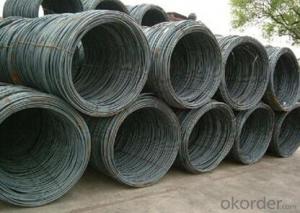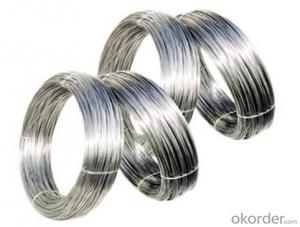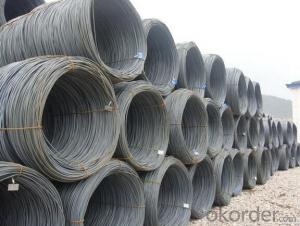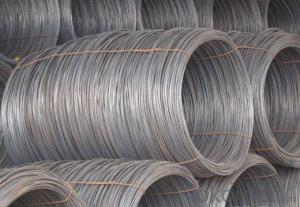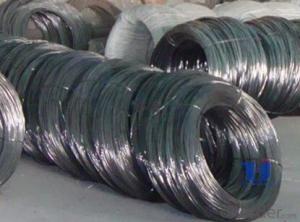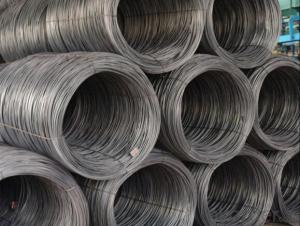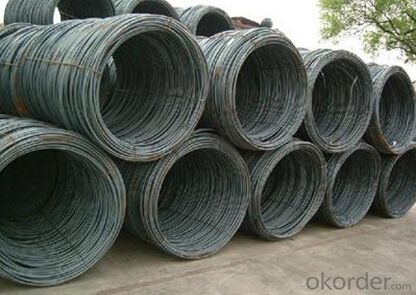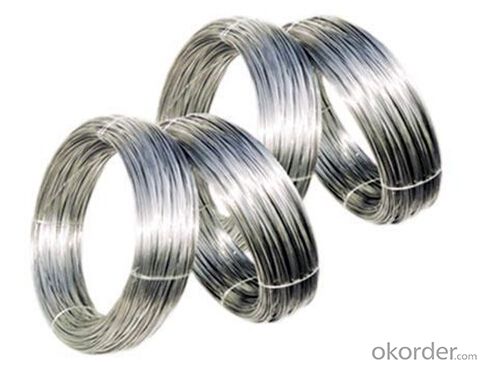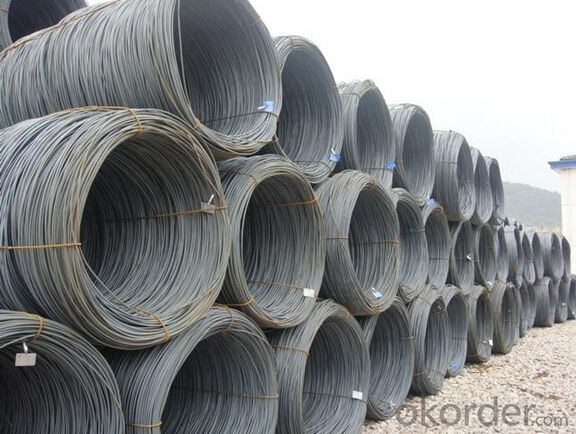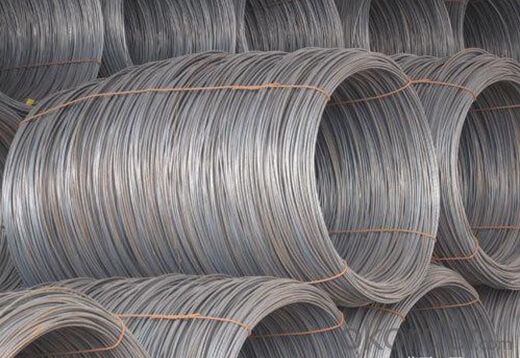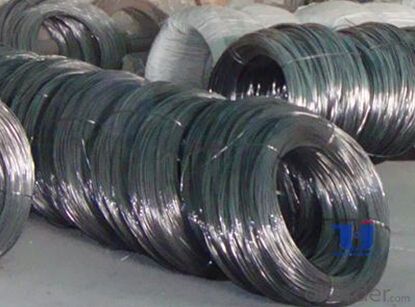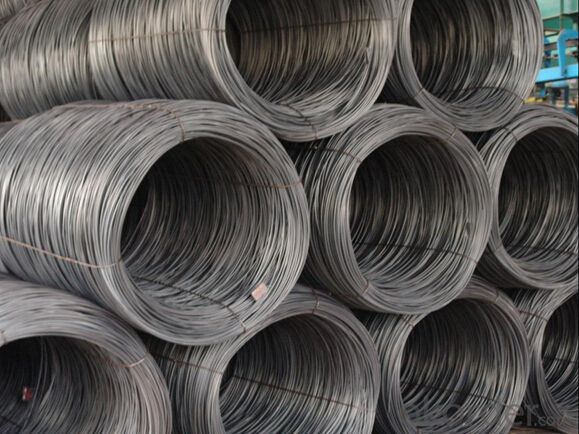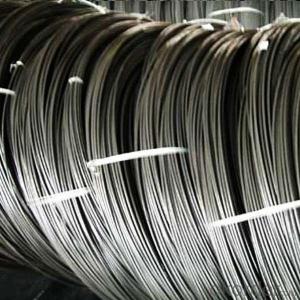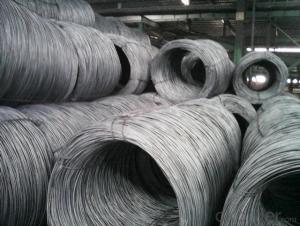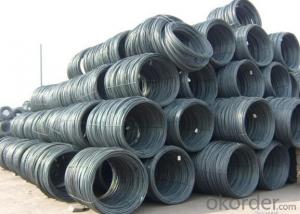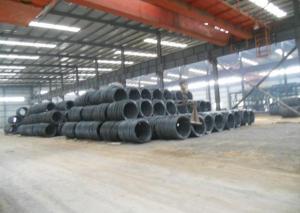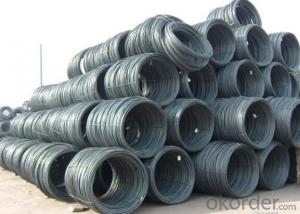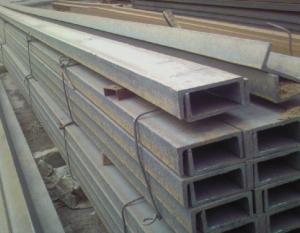Grade Q235 Hot Rolled Steel Wire Rod in Coils
- Loading Port:
- Tianjin
- Payment Terms:
- TT OR LC
- Min Order Qty:
- 3 m.t.
- Supply Capability:
- 10000 m.t./month
OKorder Service Pledge
Quality Product, Order Online Tracking, Timely Delivery
OKorder Financial Service
Credit Rating, Credit Services, Credit Purchasing
You Might Also Like
Specification
Type:
Carbon Steel,Spring Steel,Bearing Steel,Gear Steel,Deformed Steel,Stainless Steel,Alloy Steel
Shape:
Steel Coil,Steel Sheet,Steel Wire Rod,Steel Flat Bar,Steel Square Bar,Steel Angle,Steel Round Bar,Steel Billets
Technique:
Hot Rolled,Cold Rolled,Cold Drawn,ERW,Forged,Saw,Extruded,EFW,Spring
Surface Treatment:
Galvanized,Coated,Copper Coated,Color Coated,Oiled,Dry,Chromed Passivation,Polished,Bright,Black,PVDF Coated
Certification:
ISO,SGS,BV,IBR,RoHS,CE,API,BSI,UL
Thickness:
5.5mm, 6.5mm, 8-14mm
Width:
5.5mm, 6.5mm, 8-14mm
Length:
In coils
Outer Diameter:
5.5mm, 6.5mm, 8-14mm
Net Weight:
2m.t.
Packaging:
Seaworthy packaging
Grade Q235 Hot Rolled Steel Wire Rod in Coils
Detailed Information of the Grade Q235 Hot Rolled Steel Wire Rod in Coils
| Name | Hot Rolled High Carbon Wire Rod |
| Shape | Round Bar/Square Bar/Flat Bar/Plate/Wire |
| Standard | GB/ASTM/SAE/AISI/DIN/JIS/EN/BS |
| Surface Treatment: | Black/Peeling/Polished/Machined |
| Delivery Condition: | Hot Rolled or Forged/Peeled or Black Surface |
| Test | SGS/UT 100% Elements Testing |
| Certificate: | ISO/Mill Certificate |
| Service: | 24 hours online service / |
| more than 20 years trading and manufacture | |
| Quality Assurance: | the third party inspection, such as SGS, BV, TUV…etc. is acceptable |
| Packaging Details: | Seaworthy Packaging or as per customer's packing instruction |
Chemical Composition of the Grade Q235 Hot Rolled Steel Wire Rod in Coils
| Grade | Chemical Composition(%) | |||||
| C | Mn | Si | S | P | B | |
| SAE1008 | 0.1max. | 0.3~0.50 | 0.15max | 0.050max | ≤0.040 | >0.0008 |
| Mechanical properties | ||||||
| Yield strength(N/mm2) | Tensile strength(N/mm2) | Elongation(%) | ||||
| 250-280 | 350-380 | ≥32 | ||||
Company Introduction the Grade Q235 Hot Rolled Steel Wire Rod in Coils
CNBM International Corporation is the most import and export platform of CNBM group(China National Building Material Group Corporation) ,which is a state-owned enterprise, ranked in 270th of Fortune Global 500 in 2015.
With its advantages, CNBM International are mainly concentrate on Cement, Glass, Iron and Steel, Ceramics industries and devotes herself for supplying high quality series of refractories as well as technical consultancies and logistics solution.
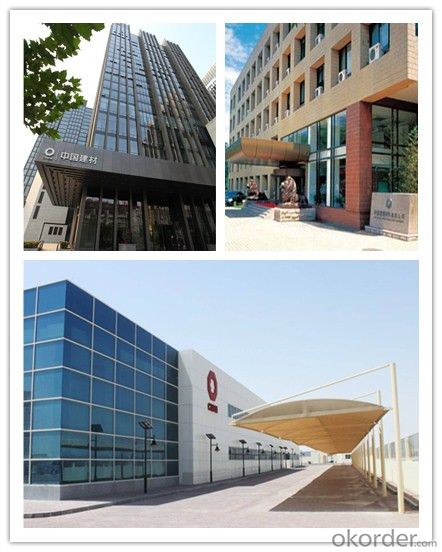
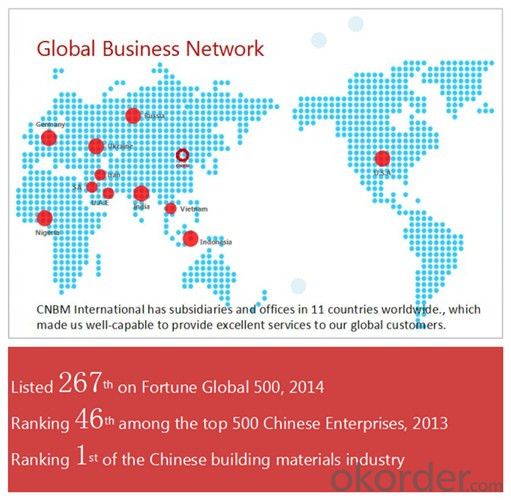
| After-sale service | CNBM provides the services and support you need for every step of our cooperation. We’re the business partners you can trust; you can relax and get on with doing business. |
| For any problem, please kindly contact us at any your convenient time, we’ll reply you in our first priority within 24 hours | |
| Advantages | Industry experience over 20 years. |
| Shipment of goods -More than 70 countries worldwide. | |
| The most convenient transport and prompt delivery. | |
| Competitive price with best service. | |
| High technical production line with top quality products. | |
| High reputation based on best quality products. |
Packaging & Delivery the Grade Q235 Hot Rolled Steel Wire Rod in Coils
| Packaging Detail | Sea worthy packing /as per customer's packing instruction |
| Delivery Detail | 15 ~ 40 days after receiving the deposit |
Products Show
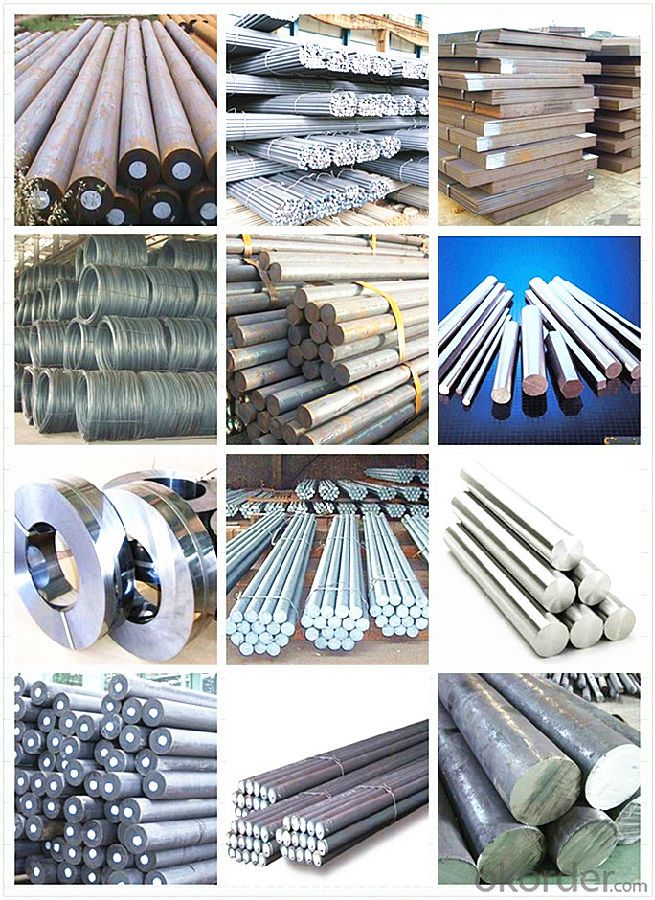
FAQ:
| Are you a trader or manufacturer? | Manufacturer |
| What’s the MOQ? | 3 metric ton |
| What’s your delivery time? | 15-35 days after downpayment received |
| Do you Accept OEM service? | Yes |
| what’s your delivery terms? | FOB/CFR/CIF |
| What's the Payment Terms? | 30% as deposit,70% before shipment by T/T |
| Western Union acceptable for small amount. | |
| L/C acceptable for large amount. | |
| Scrow ,Paybal,Alipay are also ok | |
| Why choose us? | Chose happens because of quality, then price, We can give you both. |
| Additionally, we can also offer professional products inquiry, products knowledge train (for agents), smooth goods delivery, excellent customer solution proposals. | |
| What's your available port of Shipment? | Main Port, China |
| What’s your featured services? | Our service formula: good quality+ good price+ good service=customer's trust |
| Where are your Market? | Covering more than 160 countries in the world |
- Q: What are the different forms of special steel available in the market?
- There are several different forms of special steel available in the market, including stainless steel, alloy steel, tool steel, high-speed steel, and carbon steel. Each of these forms has its own unique properties and uses, making them suitable for various applications in industries such as construction, automotive, manufacturing, and aerospace.
- Q: How is magnetic stainless steel used in the production of magnetic components?
- Magnetic stainless steel is commonly used in the production of magnetic components due to its unique combination of corrosion resistance and magnetic properties. It is particularly suitable for applications where both strength and resistance to oxidation are required. The stainless steel is typically formed into various shapes and sizes, such as rods or sheets, and then processed into the desired magnetic component. This can include items like magnets, transformer cores, or magnetic shielding components. The magnetic properties of the stainless steel facilitate efficient magnetization, making it a valuable material for the production of magnetic components in various industries.
- Q: How does special steel ensure product traceability?
- Special steel ensures product traceability through the implementation of unique identification codes, comprehensive record-keeping systems, and advanced tracking technologies. These measures enable manufacturers to accurately track and trace the entire lifecycle of the steel, from raw materials to the finished product. This ensures that any issues or defects can be identified and addressed promptly, enhancing quality control and customer satisfaction.
- Q: What are the different types of high-speed steel?
- The different types of high-speed steel include M1, M2, M3, M4, M35, M42, and T1.
- Q: How does special steel contribute to the telecommunications industry?
- The telecommunications industry relies heavily on special steel, which plays a vital role by offering the necessary strength, durability, and resistance to various environmental factors. Special steel finds its primary use in the manufacturing of transmission towers, antenna systems, and other supporting structures in telecommunications. For instance, transmission towers serve as the backbone of the telecommunications network, requiring the ability to withstand extreme weather conditions like strong winds, heavy precipitation, and even earthquakes. Special steel ensures the stability and functionality of these towers under such challenging circumstances due to its high tensile strength and resistance to corrosion. Furthermore, antenna systems also benefit from the use of special steel. Whether it's for satellite communication or wireless networks, antennas require materials with excellent electrical conductivity and low signal loss. Special steel alloys meet these requirements, enabling efficient signal transmission and reception. Moreover, special steel offers the advantage of being lightweight while maintaining its strength, making it ideal for constructing structures that need to be installed at significant heights, such as telecommunication towers. By utilizing special steel, telecommunications companies can achieve cost savings in both construction and transportation. Additionally, the durability and resistance to corrosion of special steel make it ideal for long-term use in the telecommunications industry. These properties contribute to the extended lifespan of structures and equipment made from special steel, reducing maintenance and replacement costs. The longevity of special steel also enhances the overall reliability and stability of the telecommunications network. In summary, special steel's unique properties, including its strength, durability, resistance to environmental factors, and efficient signal transmission capabilities, make it an essential material in the telecommunications industry. By providing support and reliability, special steel significantly contributes to the seamless operation of communication networks, enabling efficient and reliable connectivity for individuals and businesses worldwide.
- Q: How does special steel contribute to the efficiency of automotive engines?
- Special steel plays a vital role in enhancing the efficiency of automotive engines in various ways. To begin with, it provides exceptional strength and durability, allowing for the production of lighter and more compact engine components. This reduction in weight contributes to increased fuel efficiency, as the engine requires less effort to propel the vehicle, resulting in improved performance and reduced emissions. Moreover, special steel possesses excellent properties of heat resistance and thermal conductivity. These characteristics are particularly important in automotive engines, which generate significant heat during operation. By incorporating special steel into critical engine parts such as cylinder heads, valves, and pistons, manufacturers can effectively manage the generated heat, preventing engine overheating and ensuring optimal performance. Additionally, special steel exhibits high resistance to wear, corrosion, and fatigue, making it an ideal choice for components exposed to high levels of stress and friction in automotive engines. This enhanced durability translates into a longer engine lifespan, reduced maintenance costs, and improved reliability. Furthermore, the use of special steel allows for the production of more precise and intricate engine designs. Its superior machinability enables the creation of complex shapes and structures, optimizing airflow and combustion within the engine. This leads to improved fuel combustion efficiency, power output, and overall engine performance. In conclusion, the contribution of special steel to the efficiency of automotive engines cannot be underestimated. Its properties of strength, heat resistance, durability, and machinability enable the production of lighter, more durable, and high-performing engine components. By integrating special steel into automotive engines, manufacturers can achieve enhanced fuel efficiency, reduced emissions, longer engine lifespan, and improved overall performance.
- Q: What are the main applications of special steel in the telecommunications sector?
- Special steel is widely used in the telecommunications sector for various applications. One of the main uses is in the manufacturing of transmission towers and antennas, where high strength and corrosion resistance properties are crucial for ensuring stability and durability. Special steel is also utilized in the production of cables and wires, providing excellent conductivity and resistance to wear and tear. Additionally, special steel is employed in the fabrication of satellite communication equipment, providing the necessary strength and resilience to withstand harsh environmental conditions. Overall, special steel plays a vital role in the telecommunications sector by enabling the construction of reliable and high-performance infrastructure.
- Q: How are aluminum alloys used in the automotive industry?
- Aluminum alloys are extensively used in the automotive industry due to their lightweight, high strength, and corrosion-resistant properties. These alloys are commonly utilized in the manufacturing of various components, such as engine blocks, cylinder heads, wheels, and body panels. By incorporating aluminum alloys, vehicles can achieve improved fuel efficiency, better performance, and enhanced safety while reducing overall weight and emissions.
- Q: How is special steel used in the marine industry?
- Special steel is used in the marine industry for various applications such as building ship hulls, constructing offshore platforms, manufacturing propeller shafts, and fabricating marine equipment. Its high strength, corrosion resistance, and durability make it ideal for withstanding harsh marine environments and ensuring the safety and reliability of marine structures and components.
- Q: What are the requirements for special steel used in ballistic protection?
- The requirements for special steel utilized in ballistic protection are quite rigorous and specific. Firstly, in order to effectively endure the impact of ballistic threats, the steel must possess a high level of hardness and strength. This is typically achieved by incorporating alloying elements like chromium, nickel, and molybdenum, which enhance the steel's strength and hardness. Furthermore, the steel should demonstrate exceptional toughness and ductility to prevent brittle fracture upon impact. This is crucial as it guarantees that the steel can absorb and disperse the energy from the ballistic threat, reducing penetration and minimizing the risk of injury. Moreover, the special steel used in ballistic protection should exhibit outstanding resistance to deformation and penetration. It should be capable of withstanding deformation even under high-velocity impact, maintaining its structural integrity and preventing the penetration of the ballistic threat. Another vital requirement is good weldability, as many components of ballistic protection are typically assembled through welding. The steel should have low susceptibility to cracking during the welding process, allowing for the creation of strong and dependable ballistic protection systems. Lastly, the special steel employed in ballistic protection should possess excellent corrosion resistance. This is necessary to ensure the durability and longevity of the protective equipment, particularly in environments where exposure to moisture, chemicals, or harsh weather conditions is likely. To fulfill these requirements, various types of special steel have been developed, such as high-hardness armor steel, ballistic steel, and armor-piercing steel. These steels often undergo rigorous testing and certification processes to ensure they meet the necessary ballistic protection standards.
Send your message to us
Grade Q235 Hot Rolled Steel Wire Rod in Coils
- Loading Port:
- Tianjin
- Payment Terms:
- TT OR LC
- Min Order Qty:
- 3 m.t.
- Supply Capability:
- 10000 m.t./month
OKorder Service Pledge
Quality Product, Order Online Tracking, Timely Delivery
OKorder Financial Service
Credit Rating, Credit Services, Credit Purchasing
Similar products
Hot products
Hot Searches
Related keywords
